

'Consciousness and the Philosophers': An Exchange. In response to: Consciousness & the Philosophers from the March 6, 1997 issue To the Editors: In my book The Conscious Mind, I deny a number of claims that John Searle finds “obvious,” and I make some claims that he finds “absurd” [NYR, March 6].
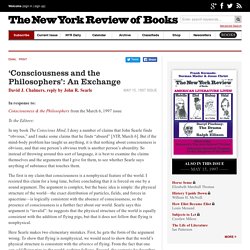
But if the mind-body problem has taught us anything, it is that nothing about consciousness is obvious, and that one person’s obvious truth is another person’s absurdity. So instead of throwing around this sort of language, it is best to examine the claims themselves and the arguments that I give for them, to see whether Searle says anything of substance that touches them. The first is my claim that consciousness is a nonphysical feature of the world. Here Searle makes two elementary mistakes. The underlying point is that the position of pigs—and almost everything else about the world—is logically derivable from the world’s physical structure, but the presence of consciousness is not. The next issue is my nonreductive functionalism.
Precis of _The Conscious Mind_ David J.
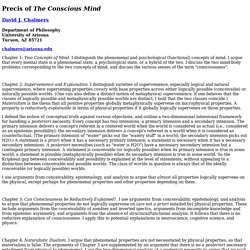
Chalmers Department of Philosophy University of Arizona Tucson, AZ 85721 chalmers@arizona.edu. DIEIOS.1. 20 Years of the Hard Problem of Consciousness. Dirty Secrets of Consciousness by David Chalmers. David Chalmers and Sam Harris Interview. Constructing the World - David Chalmers - Oup Oxford - ebook (ePub) - Paris Librairies. MIT CogNet. MindPapers: 5.4. Free Will. The Mind–Body Problem. Philosophers from Descartes to Kripke have struggled with the glittering prize of modern and contemporary philosophy: the mind-body problem.
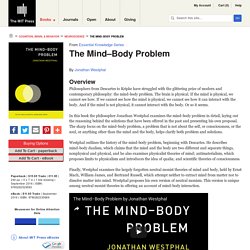
The brain is physical. If the mind is physical, we cannot see how. If we cannot see how the mind is physical, we cannot see how it can interact with the body. And if the mind is not physical, it cannot interact with the body. Or so it seems. In this book the philosopher Jonathan Westphal examines the mind-body problem in detail, laying out the reasoning behind the solutions that have been offered in the past and presenting his own proposal. Amazon. Ned Block, Department of Philosophy. NED BLOCK (Ph.D., Harvard), Silver Professor of Philosophy, Psychology and Neural Science, came to NYU in 1996 from MIT where he was Chair of the Philosophy Program.
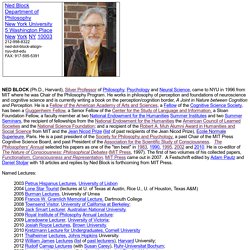
He works in philosophy of perception and foundations of neuroscience and cognitive science and is currently writing a book on the perception/cognition border, A Joint in Nature between Cognition and Perception. He is a Fellow of the American Academy of Arts and Sciences, a Fellow of the Cognitive Science Society, has been a Guggenheim Fellow, a Senior Fellow of the Center for the Study of Language and Information, a Sloan Foundation Fellow, a faculty member at two National Endowment for the HumanitiesSummer Institutes and two Summer Seminars, the recipient of fellowships from the National Endowment for the Humanities the American Council of Learned Societies and the National Science Foundation; and a recipient of the Robert A.
Département de philosophie - FOREST, Denis. Enseigner au collège ou au lycée général : le CAPES - Devenir enseignant. Le concours interne du Capes concerne certaines personnes qui ont déjà travaillé dans la fonction publique, qui peuvent justifier de trois ans d'exercice de service public et qui détiennent une licence (ou équivalent). Pour vous inscrire au Capes interne, vous devez remplir plusieurs conditions : Les conditions générales. Capes philosophie : prépa concours externe. Le Capes (Certificat d'aptitude au professorat de l'enseignement du second degré) permet d'enseigner dans les collèges et lycées de l'enseignement public.
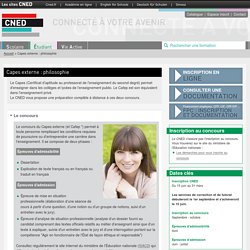
Le Cafep est son équivalent dans l'enseignement privé. Le CNED vous propose une préparation complète à distance à ces deux concours. Le concours Le concours du Capes externe (et Cafep *) permet à toute personne remplissant les conditions requises de poursuivre ou d’entreprendre une carrière dans l’enseignement. Universidade do Porto - Academia.edu. The relationship between embodying emotions, feeling emotional states and acquiring and using information about emotion is currently the subject of a substantial amount of research in psychology and neuroscience.
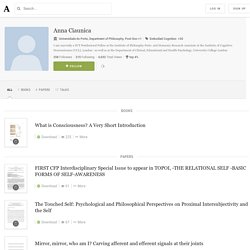
One ... more abstractThe relationship between embodying emotions, feeling emotional states and acquiring and using information about emotion is currently the subject of a substantial amount of research in psychology and neuroscience. One of the most robust cases of mimicry is mirroring of emotional facial expressions, which facilitates social interaction, emotional contagion and emotion recognition (Dimberg 1982; Lundguist & Dimberg 1995; Niedenthal et al. 2005). The fundamental social process of automatic mimicry seems impaired in disorders such as autism. Crucially, unlike motor stereotypies and repetitive behavior, the lack of social and emotional mirroring is unique to the disorder. Anna Ciaunica (Institute of Philosophy Porto /& Research Department of Clinical, Educational and Health Psychology, University College London) on ResearchGate - Expertise: Applied Philosophy, Developmental Psychology, Clinical Psychology.
Consciousness as a Fundamental Building Block of the Universe. In this wonderful TED talk, the philosopher David Chalmers invites for a new paradigm in science in which consciousness is established as a fundamental and possibly universal building block of nature.
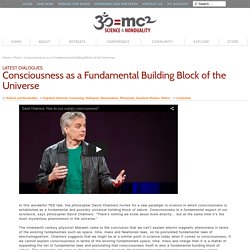
Consciousness is a fundamental aspect of our existence, says philosopher David Chalmers: “There’s nothing we know about more directly… but at the same time it’s the most mysterious phenomenon in the universe.” The nineteenth century physicist Maxwell came to the conclusion that we can’t explain electro magnetic phenomena in terms of the existing fundamentals such as space, time, mass and Newtonian laws, so he postulated fundamental laws of electromagnetism. The second idea Chalmers postulates, is that consciousness might be universal and that every system down to the elementary particles has degrees of consciousness. This view is also called panpsychism in philosophy or nonduality in the mystical traditions.
Why Beauty Matters ∇ Roger Scruton BBC. Christian Leonardo. Harvard Studied People For 75 Years & Found That Happiness Comes From One Thing... David Chalmers: Comment expliquer la conscience. The Stupidity of the Crowd - Olga Khazan. New research shows that groups make worse decisions than individuals do when the choice is really obvious.
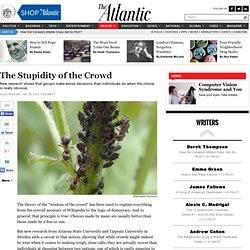
Expérience de pensée. Un article de Wikipédia, l'encyclopédie libre.
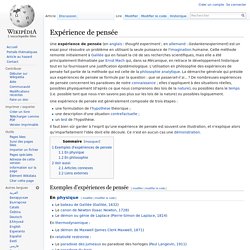
Une expérience de pensée est généralement composée de trois étapes : Il faut bien sûr garder à l'esprit qu'une expérience de pensée est souvent une illustration, et n'explique alors qu'imparfaitement l'idée dont elle découle. Ce n'est en aucun cas une démonstration. Les quatre paradoxes de Zénon d'Élée. Les quatre paradoxes de Zénon d'Élée [1] par Lycée international de Saint-Germain-en-Laye [2] Introduction.
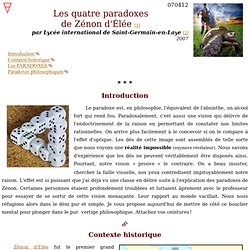
Bateau de Thésée. Un article de Wikipédia, l'encyclopédie libre. Iles flottantes des Uros, Lac Titicaca. Le jonc est périodiquement remplacé. Les écoles de Chicago (1/4) : Leo Strauss - Idées. Par Adèle Van Reeth Réalisation : Philippe Baudouin Lectures : Jean-Louis Jacopin Vous l’aurez compris, cette semaine les NCC vous emmènent dans le grand incendie de la pensée de Chicago, dans la boucle des économistes, sociologues et philosophes qui, tout au long du 20ème siècle, ont donné naissance à ce que l’on nomme des écoles de pensée encore bien vivantes aujourd’hui. Des aventures intellectuelles souvent contradictoires, divisées entre l’impossible deuil d’un monde ancien et la nécessité de forger de nouveaux outils pour penser une difficile modernité.
Milton Friedman, Leo Strauss, Albion Small, Allan Bloom, John Dewey, Saul Bellow, tous interrogent le libéralisme intellectuel et économique et la place de l’homme dans la démocratie américaine et occidentale. Tout de suite, pour commencer cette semaine, j’ai le plaisir d’accueillir Gérald Sfez qui vient évoquer pour vous la pensée de Léo Strauss. Peter Railton. Un article de Wikipédia, l'encyclopédie libre.
Peter Railton (né en 1950) est actuellement professeur de philosophie à University of Michigan ses recherches se concentrent sur la méta-éthique, l'éthique normative et le conséquentialisme. Il se présente lui-même comme un réaliste moral (moral realist) naturaliste.